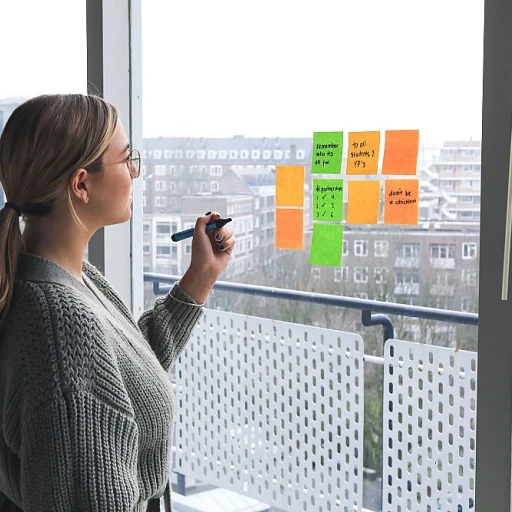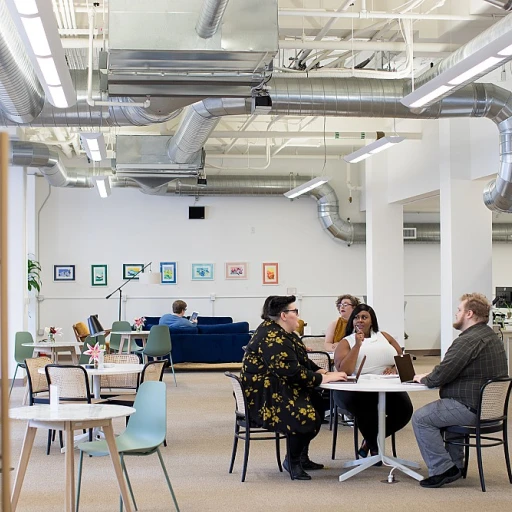Defining the Skills Development Facilitator
Unveiling the Role of Skills Development Facilitator
In the ever-evolving business climate, understanding the skills gap and closing it is crucial for both organizations and employees. A central figure in this effort is the Skills Development Facilitator (SDF). But what exactly does this role entail?
An SDF functions as a bridge between an organization's objectives and its workforce's skill sets. By assessing what skills are currently needed, and aligning them with strategic goals, they help companies minimize the skill gaps that can hinder productivity and growth. Development facilitators are pivotal in both initiating and seeing through training programs and learning interventions.
Beyond mere oversight, these facilitators champion the continuous learning culture within a business, ensuring that each annual training initiative effectively meets its needs. They are responsible for crafting comprehensive workplace skills plans, which often involve collaboration with various stakeholders, including education training providers and sector education and training authorities (SETAs).
Considering South Africa's changing regulatory environment, compliance becomes a significant part of the SDF's duties. Organizations must adhere to certain training development standards, which often require submitting an annual training report. Facilitators ensure these compliance metrics are met, safeguarding the business from potential legal repercussions.
The essence of the SDF role is in its adaptability and understanding of both soft skills and technical expertise. As businesses face rapid changes, the role of these facilitators will continue to evolve, highlighting the need for strong career development strategies.
Key Responsibilities of a Skills Development Facilitator
Core Duties and Contributions
Skills Development Facilitators (SDFs) play a pivotal role in enhancing a company's workforce capabilities. Their expertise helps bridge skill gaps through strategic planning and targeted learning interventions. As facilitators, they are the linchpin in aligning employee skills with business objectives to drive both personal and organizational growth.
Implementing Training Initiatives
One of the key responsibilities of SDFs involves designing and implementing effective training programs. This process entails identifying specific skill deficiencies within the workforce and tailoring training development plans that foster both hard and soft skills. They devise workplace skills plans that not only comply with legal requirements but also meet the unique needs of the employees and the company.
Ensuring SETA Compliance
To ensure that businesses adhere to industry standards, Skills Development Facilitators work closely with the Sector Education and Training Authority (SETA). They prepare detailed training reports to validate the training initiatives undertaken and ensure compliance. This not only benefits career development but also enhances business reputation and credibility in the sector.
Facilitating Workplace Learning
SDFs facilitate workplace learning through diverse formats such as workshops, seminars, and e-learning modules. By customizing these learning interventions, facilitators ensure employees gain specific skills that improve job performance and career prospects. This commitment to continuous learning aligns the employees’ career goals with company objectives, fostering a culture of personal and professional growth.
Enhancing Career Development
By establishing a structured skills development framework, SDFs also support individual career paths within the organization. With their strategic insights, these facilitators encourage employees to engage in both internal and external training opportunities that enrich their career trajectories and contribute to their long-term professional success.
Skills and Qualifications Required
Navigating the Landscape of Skills Development Facilitators
A crucial aspect of becoming a successful Skills Development Facilitator (SDF) lies in possessing the appropriate skills and qualifications, which enable them to effectively guide employees and organizations through their developmental journeys. Understanding the importance of these skills is essential for both career growth and the creation of impactful training programs.
To effectively serve in this role, facilitators must demonstrate a mix of hard and soft skills. Hard skills often include deep familiarity with workplace training initiatives, a comprehensive understanding of compliance requirements such as SETA (Sector Education and Training Authority) regulations in South Africa, and the ability to design robust workplace skills plans. These plans are key to identifying and addressing skill gaps within businesses, ensuring that employees receive the appropriate training to thrive in their roles.
A strong grasp of learning interventions can greatly enhance the effectiveness of training programs. It's the facilitator's task to implement these in ways that align with the company's strategic goals and support employee development.
On the soft skills front, an SDF needs excellent communication and interpersonal abilities. These qualities are vital for conveying complex training development concepts in an accessible manner, as well as for fostering an environment where people feel comfortable to learn and grow. Facilitators also need to exhibit problem-solving abilities, aiding them in tailoring training initiatives that cater to individual learning needs and organizational objectives.
Additionally, development facilitators must maintain a proactive approach to learning. Staying updated with the latest educational trends and techniques ensures that the training programs remain relevant and effective in addressing the ever-evolving skill gaps in the workplace. Consequently, facilitators contribute to career development by helping people learn new skills that align with both personal ambitions and business needs.
Ultimately, the role of an SDF is integral to workforce optimization and organizational growth. By honing the skills and qualifications required for this role, facilitators are better equipped to steer companies towards achieving their goals, making a meaningful impact in the process.
Challenges Faced by Skills Development Facilitators
Overcoming Obstacles in Skills Development Facilitation
Skills Development Facilitators (SDFs) play a crucial role in bridging skill gaps within the workplace. However, their path is not without challenges. A key hurdle is navigating the complexities of compliance with sector-specific regulations such as those set by the Sector Education and Training Authorities (SETAs) in South Africa. Businesses must adhere to these standards, and SDFs often find themselves at the forefront of ensuring that training programs align with compliance requirements.
Another significant challenge is the identification of appropriate learning interventions that resonate with employees' career development needs. Facilitators need to continuously assess and understand what skills are lacking in their organization, thereby shaping a skills plan that meets both employees’ and organizational goals. This involves balancing both soft skills and technical skills training initiatives, which can be difficult when resources are limited.
Moreover, SDFs often grapple with fostering engagement across various levels of the company. Ensuring that all stakeholders, from top management to the employees, understand and buy into the benefits of the training and development programs can be a considerable task. This requires effective communication and negotiation skills, as facilitators have to advocate for development initiatives amidst competing business priorities.
The role of an SDF also demands a proactive approach to professional growth. As industries evolve, so does the skill set required by employees. Facilitators need to stay ahead by constantly building their own knowledge base and adapting strategies to meet new industry trends. This is essential to ensure that the workplace skills they help develop remain relevant and impactful.
In conclusion, while SDFs face numerous challenges, their effective management can significantly contribute to a company’s growth and the personal development of its employees. Successfully navigating these obstacles ensures that skills development leads to meaningful enhancements in employee performance and overall business success.
Impact on Workforce and Organizational Growth
Driving Organizational Success through Skills Development
The influence of skills development facilitators (SDF) on workforce and organizational growth cannot be underrated. In today’s fast-paced business environment, companies are increasingly acknowledging the critical role of skills development in securing competitive advantage and fostering career advancement for employees. This investment in learning and development programs not only helps individuals bridge skill gaps but also propels organizations towards enhanced productivity and success.
Skills development facilitators play a vital role in identifying workplace skills deficits and implementing targeted learning interventions. Their ability to create strategic training initiatives ensures that employees are equipped with both the technical and soft skills necessary to excel in their roles. As a result, businesses experience increased efficiency and a workforce that is well-prepared to tackle industry challenges.
Moreover, SDFs support compliance with legislative requirements, such as those set by the Skills Development Act and linked to Sector Education and Training Authorities (SETA) in South Africa. By devising an effective annual training plan and submitting a comprehensive training report, they ensure that businesses adhere to mandated education and training obligations.
Embracing a proactive approach to training development, skills development facilitators also contribute to enhancing workplace culture. They promote an environment where employees feel valued and motivated to pursue career development opportunities. This shift not only helps in retaining top talent but also encourages employees to contribute innovative ideas, thereby driving company growth.
Ultimately, the effectiveness of an SDF in aligning training programs with organizational goals cements the foundation for sustainable development and success. As businesses continue to evolve, a focus on impactful skills development will remain a cornerstone of growth strategies, ensuring that employees are prepared to meet both current and future demands.
Future Trends in Skills Development Facilitation
Evolution of Skills Development Practices
In the evolving world of work, the role of a skills development facilitator (SDF) becomes increasingly dynamic. Companies are facing new demands, making it paramount to keep pace with continuous learning and development strategies. This includes the adaptation of workplace skills plans that are responsive to changing industry standards and the introduction of innovative learning interventions.
SDFs must harness cutting-edge education training methods to cater not only to technical competencies but also to the development of soft skills. Facilitators are instrumental in ensuring that training programs are aligned with industry requirements, helping businesses achieve compliance while meeting career development goals.
Technological Innovations Shape Learning
Technology plays a significant role in transforming how employees learn and develop skills. Development facilitators now utilize digital platforms to deploy training programs, which allows for more accessible and flexible learning experiences. This has particular relevance in South Africa, where businesses seek efficient means to enhance the skill sets of their workforce.
The rise of e-learning solutions helps to bridge the skill gaps by offering personalized learning experiences that are tailored to individual needs. Moreover, integrating artificial intelligence and data analytics in training initiatives provides valuable insights into employee progress and development, aiding in crafting more effective learning strategies.
A Collaborative Approach in Skills Development
The future of skills development involves a collaborative effort among businesses, employees, and facilitators to identify skill gaps and implement targeted training development programs. It is about creating a culture of lifelong learning within organizations, where annual training programs are more than just a requirement but an opportunity for growth and innovation.
Development facilitators will continue to act as vital connectors, aligning skills with strategic business objectives and ensuring that both individuals and organizations reach their full potential. As workplace dynamics shift, the agility and foresight of these facilitators become crucial in steering companies towards sustainable growth and success.














